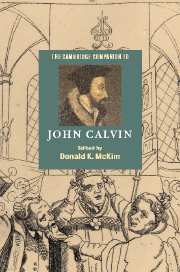14 - Calvin’s heritage
from Part III - After Calvin
Published online by Cambridge University Press: 28 May 2006
Summary
It can safely be assumed that John Calvin had an enormous impact on the world of the sixteenth century. From language, to models of community life, to habits of mind, to ideals of interpretation of religious texts - in these and numerous other areas, Calvin's effect can only be calculated, it cannot be argued. However, if that historical heritage of the Genevan reformer can be presumed, we are left with the question of the present. Certainly Calvin had great achievements in his own time. But what of his legacy? Where does Calvin's thought live today? This is not an easy question. How can one consider where the influence of John Calvin still lives today?
The difficulties are somewhat daunting. Some may deny Calvin the lion's share of influence, noting that he is not the most original thinker in the broad Reformed tradition. Others might attempt a Calvinistic “maximalism,” which seeks, for good or for ill, to see Calvin's influence almost everywhere. Neither approach is correct. When John Calvin died in 1564, he left a tremendous literary corpus, which might alone have secured his heritage.
But he also had endeavored, through an extensive network of acquaintances and a widespread correspondence, to influence the world outside of Geneva.
- Type
- Chapter
- Information
- The Cambridge Companion to John Calvin , pp. 245 - 274Publisher: Cambridge University PressPrint publication year: 2004
- 1
- Cited by

